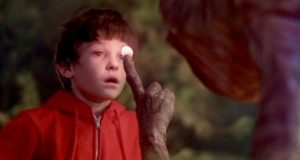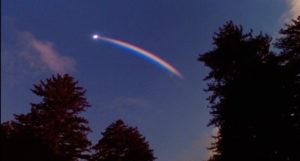E.T. the Extra-Terrestrial (1982). Directed by Steven Spielberg, Written by Melissa Mathison. Music by John Williams. Staring Henry Thomas, Drew Barrymore, and Peter Coyote. 115 mins. Rated PG.
And to the mountaintop they go, the lonely small boy and the odd green fellow, as well they (and we) should, for ascension is about to happen—and that in a seemingly thoroughly irreligious Hollywood blockbuster. That is not something we much see anywhere in movies, and especially in ostensibly secular ones. No matter, for the event about to happen was wholly impossible to foresee at the start of this film, or anywhere else, for that matter. In fact, it’s the last thing any sensible, worldly-wise soul would bet on.
Here, though, its inevitability slowly, carefully, emerges. And yes, we should have known better, given what we say we know, we smart humans, or think we know. Our arrogance is put to the test in this tale of a most unfortunate creature from some place no one’s ever heard of, save for a few sages who’ve explored the universe (scientists, in this case, though one at least reveres the wonder of all of life).
And that’s the story of ET in Steven Spielberg’s blockbuster (1982), a film tough-minded New Yorker critic Pauline Kael simply labeled as “bliss.” And that bliss culminates on that mountaintop where alien ET’s mates are coming to fetch him “home,” as in “phone home.” Though abandoned, lost, forlorn, ungainly, wasting (from earth’s toxic atmosphere), and by no human standard in the least attractive, ET slowly in the course of the story morphs into a savior figure whose loving sacrifice rescues from death his sole human friend, young Elliott (Henry Thomas), a process aptly dubbed “christomorphic.”

At last on the mountain top amid dark forest, echoing the high places where figures like Abraham, Moses, David, and Jesus wrestled with God, ET bids farewell to his earthly dear ones. In this sequence, with glowing ship in the background, adults kneel as ET addresses his followers, and his words to each largely repeats Jesus’ own words of farewell. To impious younger sister Gertie (Reese Witherspoon). he simply says “Be good,” and to brother Michael (Robert McNaughton), for his help in rescuing ET, he gives thanks. Significantly, ET’s last words to Elliott turn eschatological and deeply relational, promising a continued presence in him, for Elliott indeed “gave” himself to ET. As his finger approaches Elliott’s forehead, it bursts into light if only to accentuate the words that follow: “I’ll be right here,” suggesting a continued kind of in-dwelling in the same manner that Jesus promises the coming of the Holy Spirit, the very spirit of God, to dwell among those who believe and love. That message simply repeats the Eucharistic exchange of Elliott and ET on the gurneys, each willing to die for the other.

And, to be sure, ET enters a ship full of light, in its own way divine light, and the ship itself becomes light as it streaks across the sky, leaving a rainbow light trail, that age-old sign of hope.

We are not ultimately mired here in these darklands—though also a place of light with storms of woe, ending death slow or sudden.
That all of this story-dressing in fact bore distinctly Christian meaning was confirmed years after the film’s release by screenwriter Melisa Mathison, who confessed that mid-way through the shooting of E.T. she suddenly realized, good Catholic schoolgirl that she was, just what story she was telling. Those nuns and priests apparently did a really good job, for even when Mathison was not thinking about any religious anything; she was in fact thinking about it, and rather profoundly at that. She jokes that when she told Spielberg the recognition that had just dawned on her, he said something like “Don’t tell me, I’m Jewish!”
Sign Up for Our Newsletter!
Insights on preaching and sermon ideas, straight to your inbox. Delivered Weekly!

Categorized into Ascension
E.T. the Extra Terrestrial (1982) – 1